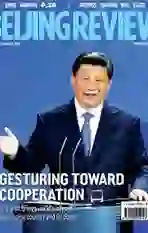Becoming Superpartners
2014-05-08
Imagine a free trade area that covers 29 countries representing one third of the worlds GDP. No longer just a wild dream, this is now a long-term goal that China and the European Union (EU) have pledged to pursue.
In a joint statement issued during Chinese President Xi Jinpings recent visit to the EU headquarters in Brussels, the first by a Chinese head of state, the two sides vowed to advance ongoing negotiations on an investment agreement. The agreement is expected to prelude a comprehensive free trade pact.
Given their strong commitment to making progress together—which was reaffirmed throughout Xis just-concluded trip to Europe—China and the EU look poised to accomplish their goals. The realization of free trade is always an uphill battle. Even the United States has encountered myriads of difficulties when negotiating its own free trade agreement with the EU—the Transatlantic Trade and Investment Partnership. But considering how far China and the EU have come despite their vast differences, there is reason to be optimistic.
This ambitious vision was unthinkable only a year ago when China and the EU were embroiled in a bitter row over solar panel imports from China. Instead of letting the dispute escalate into a full-blown trade war, they came up with an amicable solution by setting a minimum price for panels—a breakthrough that set a good precedent for the resolution of trade disputes. It also showed that the two sides are willing to cooperate and compromise for their common good.
By the same token, they will forge ahead with investment agreement negotiations with a focus on investment protection and market access. They must also collaborate to resolve other pressing issues such as the EUs recognition of Chinas market economy status and restrictions on the exports of hitech products to China before going on to discuss free trade.
Trade is only one of the testaments to the cooperative spirit at work in China-EU relations. Their collaboration has long transcended the business sphere to make an impact on global issues ranging from counter-piracy to climate change. From a cultural perspective, it may be argued that their across-the-board cooperation is grounded in a shared belief in the time-honored philosophy of harmony in diversity. With this idea in mind, they may become superpartners committed to world peace and development some day, instead of superpowers that seek to dominate international affairs.
